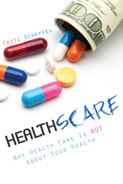
 |
Why do many Americans equate health insurance with health, and when did health insurance stop being insurance? When did the term "healthcare" come into vogue? And what components comprise the health industry? These are but a smattering of questions that grace the pages of Scheffel's eye-opening guidebook. Scheffel takes a serious look at today's so-called American healthcare system and offers timely solutions to real health and wellness.
A longtime pharmacist, Fritz Scheffel, writes a compelling book about the changes and corruption that have taken place in the American health system since the late 1960s. Written in layman's terms for all to understand, Scheffel's third-person narrative is a mix of his pharmaceutical experiences and personal health problems, as well as American medical history. Scheffel zeroes in on key issues that affect the well being of all Americans on both sides of the coin—patients and doctors, which include drug shortages, advertisements of legend-category drugs, co-pay insurance plans, medical billing, and unwanted participants (government, health insurance, and lawyers)—to name a few. Scheffel's comments toward politicians, Obamacare, and lawyers are rather sharp. Yet he balances his viewpoints with clear examples—both general and personal—that highlight the ill effects of a governmentally run health system.
While the present medical design appears dismal, Scheffel reminds readers that there are things that can be done to create positive health change, such as his holistic Ten Tenets for Better Health and "the four things that have to happen before Americans can enjoy better-run and more workable health care." Although Scheffel presents non-researched-based information, readers will appreciate his keen insight. Indeed, Scheffel's professional experiences and personal testimony are enough evidence to show that there is definitely something wrong with the American health system.
RECOMMENDED by the US Review